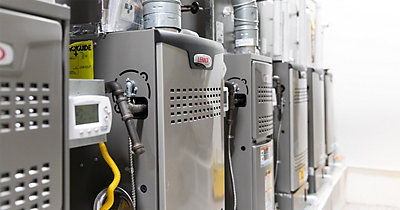How Long Will My Furnace Last? When Should I Replace It?

October 24, 2024
Like most household appliances, your heating system won’t last forever. With something as essential and expensive as a furnace, you want to extend its service life as much as possible. One question we often hear from our customers is, “How long will my gas furnace last?” While this is a difficult question to answer since there are so many factors at play, we can provide you with some information on average furnace lifespans, furnace replacement signs, and some ways you can delay the inevitable.
Average Furnace Lifespan
While some units can last more than 30 years, this is extremely rare, and the average lifespan of a gas furnace is around 15 to 30 years. As long as you keep up to date with yearly maintenance, your furnace should easily last more than 15 years.
Here are some factors that will affect your gas furnace replacement age:
Make and model of the furnace: Newer heating systems have longer lifespans than older units. As newer units are more efficient, they require less energy to heat your home, resulting in reduced wear and tear.
Frequency and quality of furnace maintenance: In order to maintain manufacturer’s warranties and keep your system clean and efficient, schedule fall furnace maintenance every year from a licensed HVAC company. Our seasonal furnace service includes a thorough cleaning, inspection of various components and a tune-up and recalibration of your equipment to optimize efficiency.
Moisture levels and proper ventilation: Too much moisture can cause heater components to rust and will result in premature breakdowns. Moisture is especially harmful to your heat exchanger.
Proper installation: According to Energy Star, over half of all new HVAC systems are improperly installed. As a result, rated efficiency levels can be reduced by as much as 30%, leading to premature breakdowns, comfort problems, and insufficient air distribution and dehumidification. Proper furnace installation is the most critical factor in increasing its lifespan.
As you can see, many factors affect how long your furnace will last. It’s important to consider all of these factors when choosing a new furnace.
Should I Replace My Furnace?
When it comes to the life expectancy of a furnace, there are too many variables to give a definite answer. Speak with a professional to help determine whether you should replace your furnace.
Homeowners with furnaces more than 15 years old, however, may experience more significant savings in the long run by replacing their system rather than continuing to spend more money on repairs. Older furnaces tend to be extremely inefficient and can cost you hundreds of extra dollars on fuel and operating costs.
According to the U.S. Department of Energy, homeowners can expect a good return on investment by replacing a furnace with an annual fuel utilization efficiency (AFUE) rating lower than 80% with a new 95% efficient condensing furnace.
Upgrading a furnace older than 15 years with a new high-efficiency unit is a great way to save money in the long run and increase home comfort and efficiency. High-efficiency furnaces have an AFUE rating between 90% and 99%, condensing flue gasses to a second heat exchanger to reduce wasted energy and convert nearly all the fuel to useful heat for your home. The age and AFUE rating are just two of many reasons to consider replacing your furnace.
Of course, replacing your heating system is a big decision, but it’s also essential to find a good HVAC company to do the installation. Before deciding, contact our team at Service Champions to discuss your repair and replacement options.
Life Expectancy of Common Heating Systems
The life expectancy of your heating unit will change depending on the system you have in your home. According to the U.S. Dept. of Energy, the average lifespan of standard heating systems is as follows:
Furnaces: 15-30 years
Boilers: 15-30 years
Heat Pumps: 15 years
Active Solar Heating: 20+ years
Electric Heating: 20+ years
Want to extend the lifespan of your unit? Factors to consider:
Equipment quality: The quality of the installed unit can predict how long a system will run. Work with your professional HVAC company to determine the best grade unit for your home, needs, and goals.
Annual maintenance: Professional maintenance, once in the spring and once in the fall (between harsher-weather months), is vital to extending any heating system's lifespan. Annual tune-ups and cleanings will ensure that the system and all its mechanical pieces operate smoothly and efficiently. A well-maintained unit will last years beyond a system that is not.
Use: In a colder climate, or depending on preference, you may rely heavily on your heating system. A unit that you use often is more likely to wear down. Systems you use often should be maintained frequently to slow the effects of use.
Humidity: Due to location, we definitely feel the effects of humidity in the air. A furnace is prone to rust in high humidity. Control the humidity levels in your home to decrease moisture and protect the furnace from rust.
Clean filters: Clean filters lead to happy heaters. When the furnace runs more than usual in the winter months, you should change the filters monthly. Dirty filters restrict airflow, leading to overheating and even damage to the unit's heat exchanger and other components.
Call Service Champions for Expert Furnace Service
Contact Service Champions to schedule a furnace tune-up or to talk to a local professional about extending the lifespan of your existing heating system. With an A+ BBB rating and thousands of five-star reviews, you can trust that you’re hiring the best.
Call us or book online to schedule your service today. Don’t forget to ask about our Maintenance Value Plan, where you can receive scheduled annual tune-ups, exclusive discounts, and other VIP benefits. We also offer flexible financing options so you can find a payment plan that works for your budget.
Frequently Asked Questions
What are the signs that my furnace needs to be replaced?
Rising energy bills, inefficient heating, strange noises coming from the unit, visible damage, and a constant need for repairs are the top signs of a failing gas furnace. If your furnace displays these signs, contact our team to discuss your repair or replacement options.
Does the age of my furnace matter when deciding to replace it?
Yes. If your furnace is not effectively heating your Northern California home or is costing you more in repairs than it would for replacement, it’s likely best to replace it, regardless of its age.
What are the benefits of replacing my furnace?
Replacing your furnace can benefit your home, health, and wallet. Installing an energy-efficient model will decrease your energy bills, heat your home more better, improve your air quality, and lower repair costs. Call our team today to learn more about the new systems available.
